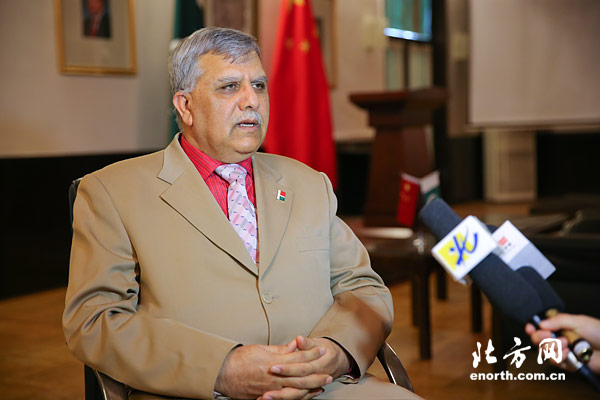China’s Pivotal Role in Strengthening the G-20 Agenda
November 22 , 2024The G-20, or Group of Twenty, is a premier forum for international economic cooperation, uniting the world’s major economies to address global challenges.
By PROF. ENGR. ZAMIR AHMED AWAN
The G-20, or Group of Twenty, is a premier forum for international economic cooperation, uniting the world’s major economies to address global challenges. Established in 1999 in response to financial crises, the G-20 brings together 19 countries and the European Union, representing about 85% of global GDP, 75% of international trade, and two-thirds of the world’s population. Member nations include advanced economies such as the United States, Japan, Germany, and emerging powers like China, India, and Brazil.
The G-20 aims to ensure global economic stability, promote sustainable development, and address pressing issues such as climate change, inequality, and public health. It serves as a platform where diverse nations collaborate to navigate challenges that transcend borders, fostering dialogue and shared solutions.
Major Achievements of the G-20
Over the years, the G-20 has demonstrated its capacity to act decisively. Notably, during the 2008 global financial crisis, it played a critical role in stabilizing the world economy through coordinated fiscal and monetary policies. The G-20’s efforts have also been instrumental in advancing the Paris Agreement on climate change, enhancing international tax cooperation, and addressing the COVID-19 pandemic through vaccine distribution and economic recovery strategies.
Key Highlights from the Brazil Summit
The recent G-20 Summit in Brazil was held under the theme “Sustainable Growth and Shared Future,” reflecting the forum’s commitment to inclusivity and resilience. Key outcomes included agreements on fostering green transitions, advancing digital innovation, and mitigating global inequalities. Leaders emphasized the importance of debt relief for low-income countries and increased support for sustainable infrastructure in the Global South.
A landmark achievement was the adoption of the “Global Climate Finance Initiative,” aimed at mobilizing trillions in climate funding to help developing nations combat the effects of climate change. The summit also reinforced commitments to food security and strengthening global health systems in the face of rising challenges.
China’s Contributions to the G-20 Agenda
China, as the world’s second-largest economy and a G-20 founding member, has consistently played a proactive role in shaping the forum’s agenda. China’s vision for an interconnected and inclusive world economy is evident in its initiatives promoting sustainable development and poverty alleviation. At previous summits, China has championed the Global Development Initiative, which aligns with the United Nations’ Sustainable Development Goals (SDGs), focusing on green energy, innovation, and digital connectivity.
President Xi Jinping’s presence at the Brazil Summit further underscored China’s leadership in global affairs. In his keynote address, President Xi called for greater solidarity and cooperation among G-20 nations, emphasizing that challenges such as climate change, economic disparity, and geopolitical tensions demand collective action.
Key Points from President Xi’s Speech
Promoting Global Peace and Stability: President Xi highlighted the importance of multilateralism and dialogue to resolve conflicts, reaffirming China’s commitment to peacebuilding efforts worldwide.
Driving Sustainable Development: He urged G-20 members to prioritize green growth and accelerate renewable energy transitions, offering China’s experience as a global leader in solar and wind energy production.
Advancing Inclusive Growth: President Xi reiterated the need for equitable development, calling for debt relief measures and enhanced financial support for the Global South.
Strengthening Global Governance: He advocated for reforms in international financial institutions to ensure fairer representation for emerging economies, aligning with China’s broader stance on making global governance more inclusive.
China’s Broader Role on the Global Stage
China’s active participation in the G-20 reflects its vision of building a community with a shared future for humanity. Beyond the G-20, initiatives such as the Belt and Road Initiative (BRI) have demonstrated China’s commitment to global connectivity and economic integration. The Global Security Initiative and the Global Development Initiative further highlight China’s comprehensive approach to addressing global challenges, encompassing economic, environmental, and security dimensions.
Optimism for the Future
As the G-20 evolves, China’s contributions will remain pivotal in fostering a cooperative and equitable global order. The Brazil Summit exemplified the G-20’s enduring relevance in addressing humanity’s shared challenges, with China playing a central role in steering discussions toward actionable outcomes.
President Xi’s vision, rooted in collaboration, inclusivity, and sustainability, offers a beacon of hope in turbulent times. As the world grapples with pressing issues, China’s leadership within the G-20 serves as a testament to the power of collective action, ensuring that the forum continues to deliver on its promise of a better, more prosperous future for all.
Summary
The G-20 remains an indispensable platform for addressing global challenges, and China’s contributions exemplify its dedication to fostering peace, security, and economic resilience. The rise of China, has enabled it to play much larger role in global developments, and global economy. China has resources and strong will to share its share of global responsibilities. China is in position to navigate the geopolitics toward peace, security, and prosperity. Through constructive dialogue and visionary leadership, the G-20 is well-positioned to shape a brighter future, where shared growth and sustainable development become realities for all nations.

Prof. Engr. Zamir Ahmed Awan
Prof. Engr. Zamir Ahmed Awan, Sinologist (ex-Diplomat), Non-Resident Fellow of CCG (Center for China and Globalization), National University of Sciences and Technology (NUST), Islamabad, Pakistan.
From Modern Diplomacy, 2024-11-22
Topical News See more






